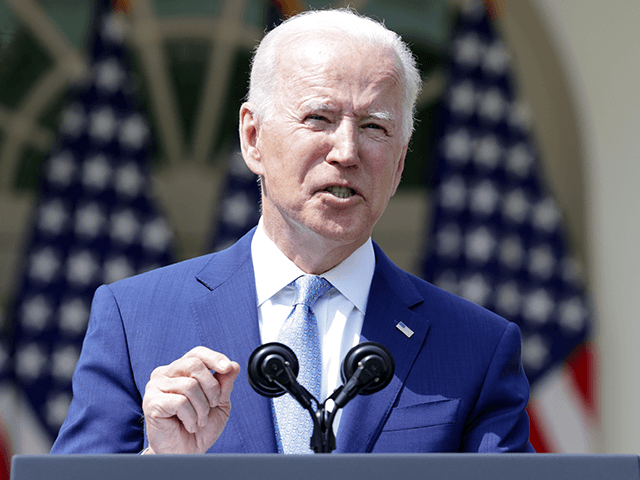President Joe Biden told reporters Thursday he is “prepared to take further actions” against Russia if it “continues to interfere with our democracy,” on the same day Turkish government reports claimed Biden had canceled a scheduled U.S. warship mission apparently meant to deter menacing Russian behavior in the Black Sea.
Biden had his second phone conversation with Russian leader Vladimir Putin since being inaugurated president this week, which the Kremlin described as somewhat extensive and “businesslike.” The White House claimed in its readout of the call that Biden expressed “concerns” with a growing Russian military buildup on the nation’s border with Ukraine, where Russia-backed separatists have waged a war against Kyiv since 2014. Biden also allegedly made a remark about allegations that Russia had attempted to interfere with American elections, in addition to more formidable rogue nations like China.
Biden also reportedly invited Putin to meet with him personally; Putin declined.
The Biden administration imposed mild sanctions on Russia on Thursday, including designating six Russian technology companies. Biden told reporters, according to CNBC, that he intended the sanctions not to have any major effect.
“I was clear with President Putin that we could have gone further, but I chose not to do so; I chose to be proportionate,” Biden said, stating he was avoiding “kick[ing] off a cycle of escalation and conflict with Russia.”
“If Russia continues to interfere with our democracy, I’m prepared to take further actions to respond. It is my responsibility as president of the United States to do so,” Biden claimed.
CNBC reported that Biden appeared to be responding not just to allegations that Russian government operatives used social media to attempt to influence American politics, but to “a litany of malign behaviors.” Among the most alarming to the international community, particularly NATO allies in Europe, is Putin’s decision to begin flooding the Russian border this month with military assets. Kremlin officials have tersely answered reporters questioning the moves that Russia can choose to put its soldiers anywhere within its borders and its military decisions are not the business of any other nation.
The military buildup on the Ukrainian border began after Ukrainian President Volodymyr Zelensky signed an executive decree in March announcing a plan to liberate the Crimean Peninsula, which Russia invaded and colonized in 2014. Crimea currently remains in Russian control; Kyiv insists that “over a dozen countries” support its plan to retake the region. The plan did not specify any military action against Moscow, leaving open the question of how Ukraine expects to reclaim control of Crimea.
Anadolu Agency, the Turkish government’s news outlet, reported on April 9 that the Biden administration had informed Ankara that it would pass two warships through Turkey’s Bosphorus and Dardanelles to reach the Black Sea, which Crimea sits on. America is mandated by treaty to inform the Turkish government of such moves, as both sides of both straits to enter the Black Sea are Turkish territory.
Anadolu cited “diplomatic sources” for the news last week. As it is a government entity, however, it regularly uses this language to publish reports that echo information straight from President Recep Tayyip Erdogan’s office.
“We were notified through diplomatic means 15 days in advance that two US warships would reach the Black Sea in accordance with the Montreux Convention,” the government source told Anadolu.
On Thursday, after Biden and Putin spoke personally, Anadolu reported that the Biden administration had “canceled” the move.
“No notification has been issued on possible new passages,” the news agency said.
The U.S. government never issued any statements regarding either of the potential transits. The Russian government, through Deputy Foreign Minister Sergei Ryabkov, protested the reports as “openly provocative.”
“American ships have absolutely nothing to do near our shores,” Ryabkov complained. “They are testing our strength and playing on our nerves.”
Turkey is an ally of Ukraine’s, a U.S. ally through NATO, and a historical rival of Russia’s. Erdogan has improved relations with Russia significantly through the purchase of Russian-made weaponry that violates NATO protocol and has infuriated other members of the alliance, who have failed to prevent their use by the Turkish military. While gingerly maintaining ties with Russia, Erdogan welcomed Zelensky to Istanbul last weekend for a joint summit in which the Turkish head of state affirmed his support for Ukraine’s sovereignty over Crimea.
Ukraine has recently escalated complaints that the Russian government has used its hold on Crimea to limit transit in the Black Sea. According to the Ukrainian news organization Unian, the Ukrainian Foreign Ministry issued an official complaint to Russia this week “over restrictions of navigation in the Black Sea amid the transfer of warships from the Caspian Sea.”
“The Russian Federation announced that it would close from next week to October some part of the Black Sea waters in the direction of the Kerch Strait for warships and state ships of other countries under the pretext of military exercises,” Kyiv objected. “Such actions by Russia are another attempt to violate the norms and principles of international law, usurp Ukraine’s sovereign rights as a coastal state, since it is Ukraine that is authorized to regulate navigation in that part of the Black Sea.”

COMMENTS
Please let us know if you're having issues with commenting.